|
|
|
Sort Order |
|
|
|
Items / Page
|
|
|
|
|
|
|
| Srl | Item |
| 1 |
ID:
175816
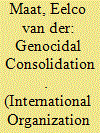

|
|
|
|
|
| Summary/Abstract |
Under conditions of guerrilla conflict, mass indiscriminate violence has been shown to effectively starve a guerrilla of its support. Consequently, counter-guerrilla mass violence is concentrated within territories where a guerrilla is dominant. However, in roughly 40 percent of mass violence episodes (e.g., Rwanda and Cambodia), the violence was aimed at populations within areas of secure territorial control. These episodes have therefore been explained by attributing ideological preferences to leaders or as unique cases only. I argue that leaders adopt mass indiscriminate violence against outgroups to consolidate power under conditions of elite rivalry. The violence serves two main goals. First, it helps build coalitions with constituencies that gain from violence; and second, it targets rival factions indirectly by forcing local security officials to facilitate or oppose the violence. The violence thereby provides rival supporters with an exit option, provides the regime with information on rival supporters’ private loyalties, and undermines rivals’ abilities to mount an effective resistance. These rivals can ultimately be purged from the regime. Based on newly collected original data on elite purges and on the type of mass indiscriminate violence for the years 1950 to 2004, I show that this type of mass violence, which I call “genocidal consolidation,” is intimately connected to authoritarian consolidation.
|
|
|
|
|
|
|
|
|
|
|
|
|
|
|
|
| 2 |
ID:
155819
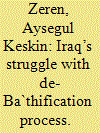

|
|
|
|
|
| Summary/Abstract |
Vetting/lustration/purging is one of many transitional justice mechanisms, designed for addressing the atrocities of a former regime, restoring peace, providing justice and engendering unity and reconciliation. It specifically aims to purify the public sphere of former regime members or of people who lack integrity. de-Ba`thification of Iraq is one of the latest transitional justice mechanism that can be examined under this category. The process of de-Ba`thification holds lessons and provides valuable insight into policy-making well beyond the Iraqi context. This article presents a detailed analysis of the implementation of de-Ba`thification process in Iraq and a number of lessons to be learned/relearned by policy-makers. Data gathering involves in-depth and formal interviews with the designers and implementers of de-Ba`thification project including Coalition Provisional Authority (CPA) administrator and advisors; Higher National de-Ba`thification Commission (HNDBC) and Accountability and Justice Commission (AJC) members; other US and Iraqi officials.
|
|
|
|
|
|
|
|
|
|
|
|
|
|
|
|
| 3 |
ID:
161550
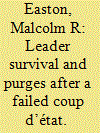

|
|
|
|
|
| Summary/Abstract |
What factors explain variation in the tenure of political leaders who survive a coup d’état? Our main hypothesis is that leaders who survive a coup attempt take the opportunity to purge known and potential rivals while also deterring future coup conspirators. The severity of the purge is also hypothesized to be positively associated with longer post-coup tenures, as potential rivals are eliminated or deterred from future coup attempts. After introducing the topic of the failed coup, and presenting the dataset we developed to measure the level of punishment associated with a failed coup attempt, we offer an analysis of the effect of purges on the survival time of leaders who survive a coup attempt. We find that, conditional on regime type, purging has an effect on lengthening leader tenure, with more severe purges being associated with longer authoritarian tenures. Democratic leaders gain no advantage. Changes in military expenditures do not increase subsequent tenure. We conclude with a discussion of the results as well as what a broader dataset might reveal.
|
|
|
|
|
|
|
|
|
|
|
|
|
|
|
|
| 4 |
ID:
190107
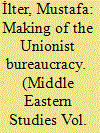

|
|
|
|
|
| Summary/Abstract |
The re-promulgation of the Constitution in 1908 upturned the late Ottoman political system, which included not just its political structure but also the bureaucratic system. Thousands of bureaucrats were dismissed from state service, regardless of their positions. Having organized the purges with limited political power, the Committee of Union of Progress (CUP) achieved a strong political project that contributed to controlling the actual state apparatus. In fact, the consensus in the literature is that purging the masses has always been an authoritarian practice prevalent in the twentieth century. This, thus, challenges the widely held notion that the CUP’s leadership preferred inspecting the government from backstage before 1913. This study aims to understand the extent of the CUP’s power in action during the early Constitutional Period. Focusing on the process of the enactment of the tensikât law, this study primarily examines the legislative methods adopted by the CUP to define the nature of power relations shared by various actors.
|
|
|
|
|
|
|
|
|
|
|
|
|
|
|
|
| 5 |
ID:
180206
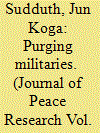

|
|
|
|
|
| Summary/Abstract |
The principal threat most autocratic leaders face stems from within the regime. To control militaries and mitigate the risk of coups d’état, many autocratic leaders repeatedly purge strong officers from the military. What are the causes and consequences of such purges? Despite its importance, scholars rarely have studied the question, as they have lacked a systematic and comprehensive dataset. The Military Purges in Dictatorships (MPD) dataset contains information on the dates and characteristics of 1,007 military purges, and covers 566 political leaders in 116 authoritarian countries over the period 1965 to 2005. In this article, I describe MPD, compare it with other datasets, present descriptive statistics on the data, and suggest its applications. By coding the timing and various characteristics of military purges, MPD facilitates empirical study of the relationships between autocratic leaders and their militaries, and thus is useful for researchers studying political violence, repression, civil-military relations, coup-proofing, leader survival, and regime transition.
|
|
|
|
|
|
|
|
|
|
|
|
|
|
|
|
|
|
|
|
|